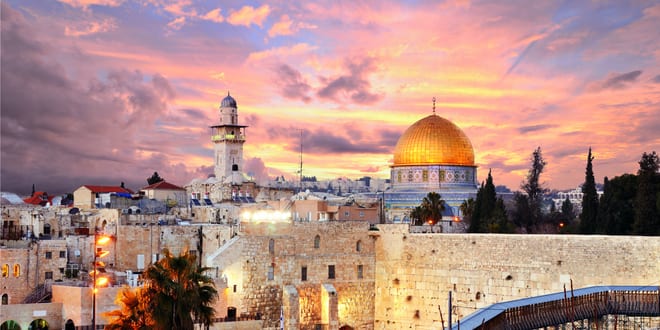With the publication of his new book Isaiah: End Times and Messiah in Judaism, Israel Rosenberg, Jerusalem resident and tour guide at the Western Wall tunnels in the Old City of Jerusalem, joins a cadre of Jewish teachers who are writing Bible commentary specifically for Christian readers.
In the book’s introduction, Rosenberg explains how Christian visitors would often ask him questions about Jewish customs and practice. He recounts how delighted he always is to respond. “People catch on quickly that I enjoy talking about my faith and our Jewish national history. Often, we get to discussing the traditional Jewish way of seeing things,” he writes.
When his tour groups include Biblically literate Chistians, the conversation often leads to a discussion of the role of Hebrew in understanding Jewish scripture. A particular discussion with two young American pastors revealed, “that though we use the same terms, such as Messiah and redemption – we have completely different meanings and contexts for understanding such words,” Rosenberg writes.
Thus began his mission to use the prophecies in the Book of Isaiah to explain to Christian readers the traditional Jewish view of these and similar concepts.
Rosenberg uses Biblical archeology to anchor his introduction to the prophet Isaiah. Isaiah was both a cousin and a father-in-law to King Hezekiah. Rosenberg describes recent archaeological discoveries, such as the inscription in the Hezekiah water tunnel, Hezekiah’s seal and Isaiah’s seal, to validate the existence of the prophet Isaiah.
The core of the book is Rosenberg’s selection of 64 passages from the Book of Isaiah that contain End Times themes. For each, he includes an image of the passage from The Great Isaiah Scroll, a 2,000-year-old scroll of the Book of Isaiah that was found in the Qumran caves near the Dead Sea in 1947.
He translated the text anew, sensitive to the idea that there are approximately eight million people in the world today who speak Modern Hebrew. “I have assumed that part of Isaiah’s role as a prophet was to understand that he would be prophesying directly to a generation that would one day be speaking a Hebrew language that was alive and functioning, just as it was in his own day.”
One of the most exciting connections Rosenberg makes between the ancient words of Isaiah and the times in which we live is the Jerusalem 5800 project. This Rosh Hashana (Jewish New Year) will inaugurate the Hebrew year 5781, so the Jerusalem 5800 project is preparing for less than a decade from today.
In the days to come, The Mount of Hashem‘s House Shall stand firm above the mountains And tower above the hills; And all the nations Shall gaze on it with joy. Isaiah 2:2
Referring to Isaiah 2:2, which speaks of a time when the Nations will come to the Temple Mount, Rosenberg writes that, “Jerusalem 5800, a detailed architectural urban planning of the future city of Jerusalem… takes into consideration the tens of millions of visitors expected to come each year. They point out that, with the removal of the Old City walls, the mountains surrounding Jerusalem will be able to handle millions of people viewing in real time the services being conducted at the summit of Mount Moriah (the Temple Mount).”
Rosenberg makes it clear that he is not trying to argue with Christians about the meaning of Isaiah’s words. He simply presents the traditional Jewish way of understanding selected verses for Christian readers. For example, he explains why Jews translate almah as young woman, rather than virgin, in Isaiah 7:14
Assuredly, my Lord will give you a sign of His own accord! Look, the young woman is with child and about to give birth to a son. Let her name him Imanu-El. Isaiah 7:14
In other passages, Rosenberg uses traditional Jewish commentary to explain the qualities that the Messiah will possess (Isaiah 11:1-9), the ingathering of the exiles (Isaiah 27:12-13) why the Bible calls Cyrus a messiah (Isaiah 45:1), Israel’s suffering servant (Isaiah 53) and dozens of other Biblical concepts related to the Messianic process and the End of Days.
Isaiah: End Times and Messiah in Judaism by Israel Rosenbeg is available on Amazon.com and through its Jerusalem publisher, Gefen Publishing House.





